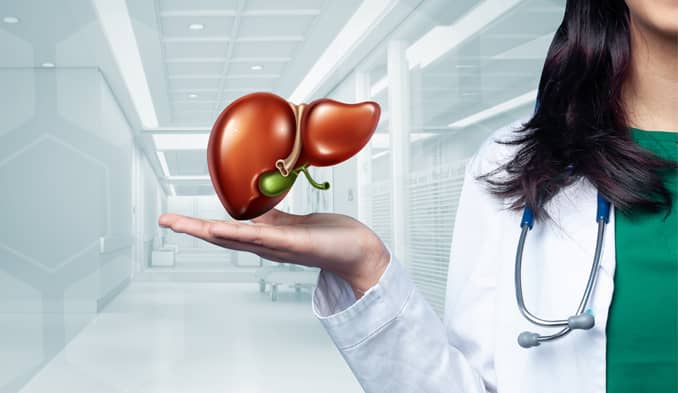-
Can you explain how liver cancer develops?
Liver cancer most often develops from chronic diseases, primarily related to excessive alcohol consumption, and from various forms of hepatitis ( B or C). These factors can lead to chronic liver problems. In recent times there has been an increase in one particularly important cause called 'fatty liver'. If this "fatty liver" is associated with inflammation, it is NASH (nonalcoholic steatohepatitis). Over the years there has been insufficient interest in NASH, but more recently, as obesity has become a serious problem in the population, there has been a renewed interest in the causes and consequences of the disease.
В САЩ, където проблемът със затлъстяването е широко разпространен, NASH вече е един от основните виновници, поради които се налага извършването на трансплантация на черен дроб. Нездравословният начин на живот допринася за нарастването на стеатозата сред хората, поради явното затлъстяване. Има и по-редки случаи, включващи генетични, автоимунни и други специфични фактори, които могат да предизвикат стеатоза, и следователно, да допринесат за развитие на рак на черния дроб.
-
How can the development of this disease be prevented?
The most important step in disease prevention is regular medical checkups to detect abnormalities in enzyme levels and warn of possible problems. It is crucial to heed the advice of doctors and, if necessary, make changes to one's lifestyle. For example, moderate alcohol consumption can play a key role. However, many ignore the seriousness of the potential risks, saying things like, "I know I drink a lot of alcohol, but it's not a big problem," or "I understand I'm a little full, but I don't see a problem." It's important to realize that ignoring elevated liver enzyme levels can lead to serious problems such as chronic steatosis, cirrhosis, and others.
-
Can you explain what impact excessive alcohol consumption has on the body?
Of course, this is an interesting question. Something that affects women in particular is that the allowable dose for them is significantly lower than that for men. There are two enzyme systems in our body that are involved in processing alcohol. One enzyme produces a toxic metabolite (formic acid) which is metabolised by the second enzyme system. The amount of toxic metabolite that accumulates in the liver depends primarily on the efficiency of the second enzyme. Its potential is relative, which is why there are people who can consume large amounts of alcohol for years without encountering liver problems, while others who drink smaller amounts are still at risk of disease.
-
What are sensible daily limits on alcohol consumption and how should these be spread throughout the week?
To maintain a healthy lifestyle, a reasonable limit for alcohol consumption per day for a man without co-morbidities is about 40 milliliters, which corresponds to about two beers. For women this limit is lower, around 20 millilitres per day, i.e. consumption of only one beer. When spreading out the daily alcohol intake, it is better to consume it all at once at the weekend instead of every night. Taking breaks after drinking alcohol is beneficial.
I would also recommend taking coffee. According to recent studies by the European Association for the Study of the Liver (EASL) on the prevention of liver cancer, frequent coffee consumption is highlighted as an effective preventive measure against the development of the disease. Extensive research has shown that people who drink 3 to 4 cups of coffee a day significantly reduce their risk of liver cancer compared to those who do not consume the beverage. This conclusion is supported by several strong studies, making coffee intake advisable.
-
What is the reason and does it make a difference whether you consume normal or decaffeinated coffee?
At the moment, there is still no very clear answer why coffee. I personally believe that it contains around two thousand substances, and we are not just talking about caffeine here, precisely because the same prevention can be achieved with decaffeinated coffee. Unfortunately, the exact constituent of coffee that aids prevention against liver cancer remains unclear, but its effectiveness is there. Impressively, under similar conditions, a patient who consumes coffee reduces the risks of developing the disease by more than 50%.
-
What about the effect of food on the liver?
When it comes to liver cancer prevention, the recommended food to consume is Mediterranean. This includes fish, white meat, olive oil, olives, lots of vegetables instead of red meat consumption. Nuts are good for the body, especially the liver, and weight control also plays an important role. Overweight and obesity are co-factors that increase the risk of liver cancer.
-
If a person is struggling with obesity and steatosis, what are the basic steps to take?
It is necessary to reduce its body weight, between 7 to 10%, which can significantly improve its condition.
-
What is your opinion on detoxification and taking supplements?
If it's about stopping the intake of alcoholic beverages, then yes, I certainly believe in detoxification. Otherwise, there are several therapies available for liver disease, but according to all the information I have, none of them are scientifically proven, and therefore I cannot confirm their benefits.
Dietary supplements would not have a negative effect on. One of the researched and scientifically confirmed dietary supplements is silymarin (milk thistle, b. r.). This unique ingredient has been the subject of many years of scientific research and has proven positive effects. However, medicine is still working on the optimal formula to ensure maximum absorption by the body. Although I have not personally prescribed it as a medication, I see no impediment to recommending it, especially if the patient is experiencing financial difficulties that make it difficult to access more effective medications that are not covered by insurance.
-
According to research conducted in Bulgaria, a significant number of people, approximately one in three, suffer from "fatty liver" due to poor eating habits and alcohol consumption. What measures would you suggest to your patients?
Fatty liver is often a consequence of metabolic syndrome. My recommendations coincide with those of cardiologists - weight reduction with 7-10%. It is important not only to change the diet, but also the lifestyle. I would encourage more physical activity and sports. For better results, it would be beneficial to do sports with a trainer and under the supervision of a specialist. It is not just about performing exercises, but about integrating physical activity into the daily regime as an integral part of the lifestyle, just like taking care of dental hygiene. Changing eating habits is also important. Non-alcoholic fizzy drinks, for example, are a serious problem and should be avoided.
-
How would you compare the harm of fizzy drinks to that of alcohol?
Carbonated drinks and alcohol are equally harmful. Drinking four large beers and four large colas is the same, as soft drinks often contain a significant amount of sugar, which poses a serious risk. In addition, the use of energy drinks, especially by young people, with high sugar content and chemical additives can be extremely harmful. It is important to educate people about the harms of everything they consume.
-
What is your opinion on the cosumption of juices and smoothies?
They are also harmful due to their high fructose content. From an evolutionary point of view, our body is adapted to store energy for periods of lack of food. When we drink juices and smoothies, fructose is stored in the liver as reserve energy. The problem arises when we consume large quantities. When you consume smoothies in moderation, there is no problem. But when consuming large amounts, unwanted consequences can occur.





